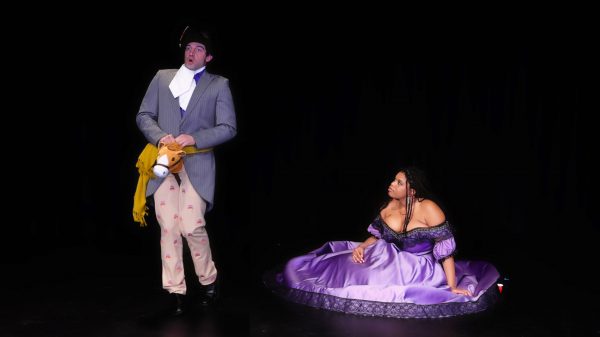Theater Review: “TJ Loves Sallly 4 Ever” — Scattershot Satire
By Erik Nikander
An exciting, subversive idea animates TJ Loves Sally 4 Ever.
TJ Loves Sally 4 Ever by James Ijames. Directed by Pascale Florestal. Staged by SpeakEasy Stage, streaming through May 13.

Jared Troilo and Tah-Janay Shayoñe in TJ Loves Sally 4 Ever. Photo: SpeakEasy Stage Company.
TJ Loves Sally 4 Ever is a gutsy satire that’s easy to admire — the piece is intent on striking back at the structures and establishments that have oppressed Black people in America for generations. Playwright James Ijames draws a direct line from the horrors of slavery to racist and sexist institutions that persist to the current day. It’s not an unfair comparison; after all, statues honoring Confederate generals still stand, and swaths of American culture have been reluctant to truly reckon with the fact that most of our founding fathers themselves owned slaves. Still, while the play’s critical thrust is promising, its attack on the iniquities of American life falls short. There’s plenty of fire in the script’s belly, but its passion is hampered by a lack of focus.
We follow the journey of Sally (Tah-Janay Shayoñe), a Black college student who is taken on as an assistant to TJ (Jared Trolio), the white, middle-aged Dean of Students. TJ, who is determined to brush aside any controversy over the college’s slave-owning founder, becomes infatuated with Sally. At first, she brushes his desperate advances aside, but he refuses to take no for an answer. The dramatist compares this exploitative one-sided romance with the notorious relationship between Thomas Jefferson and Sally Hemings, a slave owned by Jefferson who was coerced to father his children. TJ doesn’t go that far, but his lecherous presence becomes a constant source of discomfort and dread in Sally’s life.
The predatory relationship depicted here is not uncommon in the real world. As the script cites, female grad students often face harassment from college staff and faculty members. The problem is that TJ never feels much like a real threat because he never becomes a real person — he is made up of a compendium of embarrassing white-guy cliches given flesh. He talks in dated hip-hop slang, tries his best to twerk in front of Sally, and in one scene can’t tell Sally apart from her sorority sisters Pam (Dru Sky Berrian) and Annette (Sadiyah Dyce Stephens), who are also Black. This demeaning of Sally is uncomfortable to watch, but TJ is too emotionally frail and absurdly drawn to be much of a menace.
Part of the issue is the casting of Jared Trolio; the performer is much younger than his character. Sally states that TJ is old enough to be her father, but the two look as if they could easily be fellow grad students. Also problematic: whenever Sally’s in the room, director Pascal Florestal amps TJ up from his general awkward demeanor into a creature of pure horny id. He not only leers at the younger woman, but from practically the first moments they’re alone together he makes provocative comments about her beauty and how much he desires her. You can’t help but wonder how TJ got hired to work with students in the first place. Ijames can’t decide whether to make him a sweaty incel with zero impulse control around women or a schemer who consciously abuses his power to take advantage of female students.
Sally has the opposite problem — as a character, she’s so under-defined that it feels like we barely know her, even at the end of the play. This isn’t the fault of Shayoñe, who does her best to provide nuance to Sally’s emotional journey, expressing the strength and resilience at the character’s core. Her performance is one of the highlights of the production, and that makes it all the more frustrating how little the script gives her to work with. Apart from the fact that she’s friends with Pam and Annette and is a sorority member, we find out almost nothing about Sally as a person, and that includes such basic traits as what she’s studying or what her ambitions are. In fact, it’s unclear why she needs to work with TJ in the first place. It would make sense if he was a professor whose work Sally admired — his relentless wooing could serve as Sally’s rude awakening about sexism at the heart of academia, providing her a chance to grow as a character. But the nicest thing she can say about TJ’s book is that it’s “long,” so it’s unclear why she’s even decided to work with him. Some dramaturgical effort would help the play shape a more convincing sense of what’s at stake and add much-needed believability to the core relationship

Tah-Janay Shayoñe in TJ Loves Sally 4 Ever. Photo: SpeakEasy Stage Company.
Another underutilized character is Harold (Jordan Pearson), an activist acquaintance of Sally’s who is determined to tear up the university’s racist roots. When TJ asks Harold why he’s chosen to pee on a school building, he justifies himself by insisting that “someone had to expose this school’s Antebellum past.” But the institution’s prejudice is as subtle as a billboard: the homecoming party at the end of the play is clearly plantation-themed. That’s not an unrealistic event; what’s strange is that no one but Harold seems to care about the college’s blatant insensitivity. There’s no sense of a collective protest movement or a larger faculty push-back against Harold, so the conflict plays out as an individual struggle — TJ versus Harold. Another odd ingredient: the play’s sunny outlook on fraternity and sorority culture. In one instance, a frat party serves as Sally’s safe haven when TJ goes on the prowl for her. For a play anxious to satirize racist and sexist collegiate institutions, fraternity culture would seem to be an especially juicy target, but TJ Loves Sally has no interest in tackling it.
Though the script falls short as incisive social commentary, SpeakEasy Stage’s virtual presentation of the play is generally skillful — with one notable outlier. Florestal’s direction, in tandem with Wesley Verge’s video production, strikes a pleasing balance between stage and screen storytelling, utilizing film-style camera angles for some scenes and more conventional, static perspectives for others. The editing choices can sometimes be a tad rough, but they put the point across. The occasional use of green-screen backgrounds comes off as particularly artful. Given how smooth the show is to view, it’s a shame how uneven the sound mixing is; the volume oscillates from whisper-quiet to uncomfortably loud and everywhere in between. With some on-the-fly volume adjusting the proceedings are listenable, but more post-production smoothing was called for.
An exciting, subversive idea animates TJ Loves Sally 4 Ever. SpeakEasy’s cast and creative team are more than game to take on the script’s challenge to established power structures; the company deserves kudos for seeking out material that doesn’t shy away from sensitive topics. Ijames’s critique aims high, but his play falls short when it comes to creating well-defined relationships and characters that audiences can believe in and care about. Without this requisite grounding in reality, TJ Loves Sally‘s satirical barbs don’t quite sting.
Erik Nikander is a critic, playwright, and filmmaker based in the New England area. His film criticism can be read on Medium and his video reviews on a variety of topics can be viewed on Youtube at EWN Reviews.
Tagged: James Ijames, Pascale Florestal, SpeakEasy Stage Company, Tah-Janay Shayoñe
